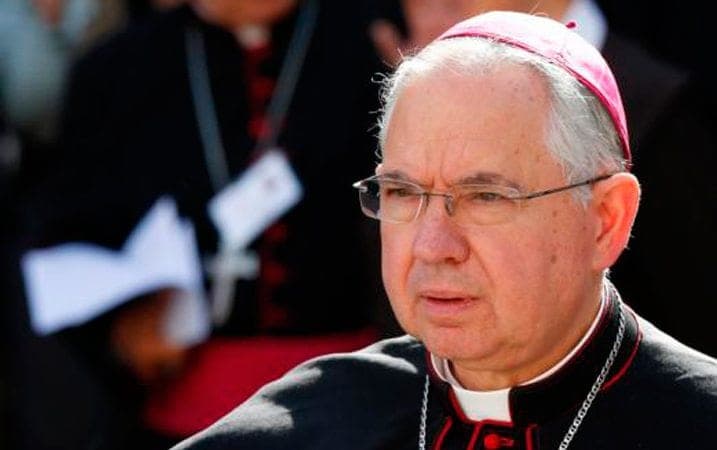Nine US bishops are taking part in the Synod of Bishops on the family, some as elected representatives of the United States Conference of Catholic Bishops, some as papal nominees, and some as members of the permanent council of the synod. Crux has been interviewing the Americans to solicit their perspectives on the event. Today, Crux speaks to Archbishop Charles Chaput of Philadelphia and Archbishop Jose Gomez of Los Angeles. Read the Chaput interview here.
ROME — A leading champion for immigrant rights among the US bishops said Tuesday he’s disappointed that the Oct. 4-25 Synod of Bishops on the family hasn’t dedicated more attention to the issue, saying that many people are hoping the summit of prelates from around the world will be “more assertive.”
“We’ve talked about [immigration], but not with the intensity, time, and dedication that I would have liked,” said Archbishop Jose Gomez of Los Angeles.
“I’m disappointed that we’re not speaking about those specific issues in a more intense way, looking for the best ways to address real needs of people,” he told Crux in an interview Tuesday.
Gomez, who was born in Monterrey, Mexico, and is now a naturalized US citizen, authored a 2013 book called “Immigration and the Next America: The Struggle for the Soul of Our Nation,” published by Our Sunday Visitor. In it, he argued that the push for immigration reform is a “human rights test of our generation.”
A member of the Catholic organization Opus Dei, the 63-year-old Gomez is the highest-ranking Latino among US Catholic bishops.
“In the United States, people have a real challenge,” Gomez said. We have 11 million immigrants that have no documents, 2 million people have been deported in the past five, six years, one in four of them were taken away from their families, so there’s the destruction of those families. This is a big problem.”
“Now [we have] the situation of the Middle East, of people coming to Europe. We need to address the situation, and we haven’t talked too much about it,” he said.
In reply to a question, Gomez said he believes it’s “fair” to say too much time has been spent at the synod focusing on a narrow set of contentious matters and not enough on broader social and cultural questions.
“I feel that there are a lot of good people out there that wanted us to be more assertive in addressing realities like immigration,” he said.
The Synod of Bishops is scheduled to produce its concluding document this week, with a paragraph-by-paragraph vote set for Saturday night. Ultimately, it will be up to Pope Francis to decide what to do with its recommendations.
On another front, Gomez was asked about a recent America magazine interview with Cardinal Donald Wuerl of Washington, DC, in which Wuerl speculated that grumbling about the process at the synod may be a way of expressing frustration with Pope Francis.
Gomez, however, said he had not seen anything at the summit that struck him as resistance to the pontiff.
“The problem is the process,” Gomez said, adding that among other things the working document for the meeting “was very poorly written, so it’s been very difficult to work on it.”
With only four working days left on the synod’s calendar, Gomez also said it’s still not clear whether the final document produced by the bishops is intended just for the pope or for “the people out there.”
“Before, the purpose of the synod was to put together a series of propositions to the Holy Father,” Gomez said. “Now it’s not clear.”
During the Oct. 4-25 Synod of Bishops on the family, there’s been much talk about the need to find “new language” to express the Church’s positions on family life, recognizing that terms such as the “indissolubility” of marriage or the “intrinsically disordered” nature of a same-sex attraction can turn people off.
Gomez endorsed the idea of trying to repackage Catholic doctrine, but not at the expense of watering it down.
“We need to find a way to communicate the beauty of the teaching of the Church, so people can understand what we’re talking about, but without the fear of saying something that is not appropriate,” he said.
Jesus himself was not “politically correct,” Gomez said.
“Sometimes we might sound strong, but that doesn’t take away that we’re pastorally reaching out for people,” he said.
As the synod nears its end, the bishops are faced with reporting to Pope Francis about where they stand on the hot-button issues under consideration. One is the so-called “Kasper proposal,” named for German Cardinal Walter Kasper, to allow some divorced and civilly remarried Catholics to receive Communion.
Gomez said that in the small working group in the synod to which he belongs, most bishops “want to keep what we have,” meaning the ban on receiving Communion, “because these are the teachings of the Catholic Church.”
At the same time, Gomez stressed that the bishops are “really trying to reach out to people and make them understand that they’re part of the Church, that they’re welcomed in the Church.”
In general, Gomez said, it’s important for people whose relationships fall short of the Catholic ideal to know the Church doesn’t start by condemning them.
“Obviously God’s plan doesn’t necessarily mean that we all have to be absolutely perfect,” he said. “It’s a goal, it’s something that we’re looking for. After all, God [also] decided that we should live in peace, but there’s war and violence everywhere.”














